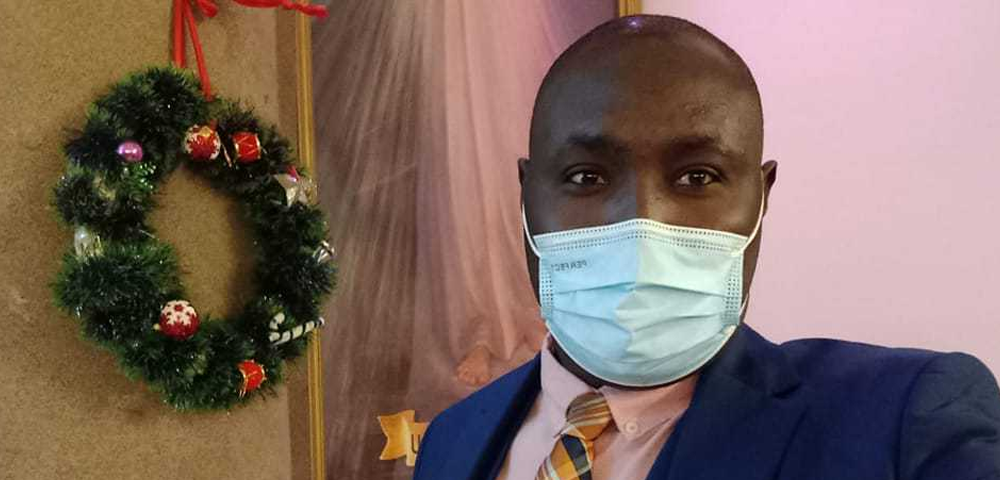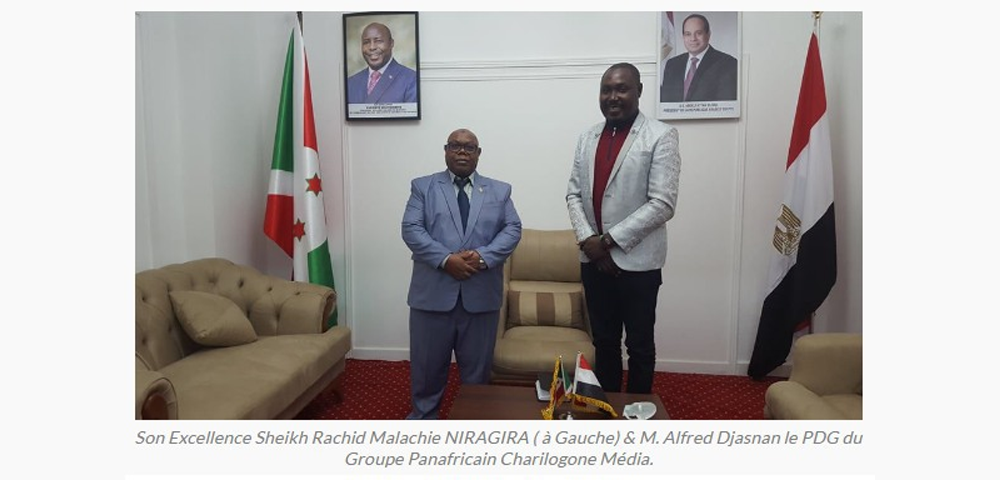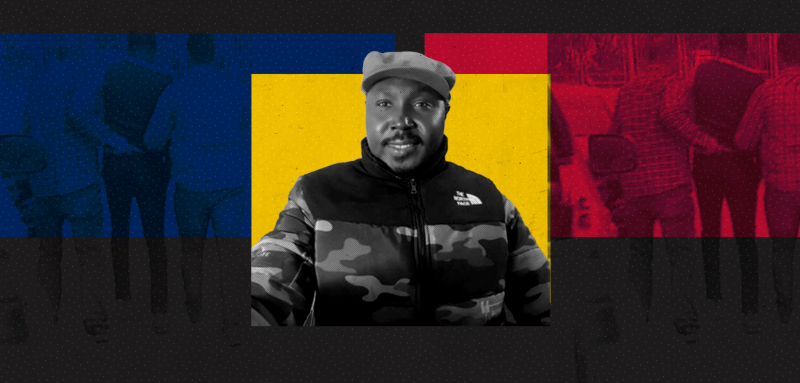The Egyptian authorities have carried out a non-judicial administrative decision to deport Chadian refugee and community activist Djasnan Alfred Camus to Rwanda. The decision was implemented in the early hours of Tuesday, May 23, after he refused to return to Chad due to risks to his security and safety upon returning to his home country, which he left as a refugee to seek asylum in Egypt.
Raseef22 contacted Alfred's family and one of his close friends, who requested anonymity to avoid trouble with the Egyptian authorities. They narrated the circumstances of Alfred's arrest on the evening of Sunday, May 14, before the Egyptian security forces charged him with unlawful residence "after the expiration of the legal period for his residency permit."
Alfred's friend, a member of the African Refugee Rights Initiative, revealed that two individuals wearing civilian clothes arrested Alfred and took him to an unknown location in a black private car. Close associates of Alfred shared a video clip documenting the incident of his arrest.
Camus's partners in the Refugee Rights Initiative believe his arrest and deportation is due to a protest organized by refugees with disabilities before the UNHCR headquarters a few hours before his arrest, even though he did not participate in or organize it
Deportation and a fragmented message of reassurance
Raseef22 obtained an audio message sent by Alfred to his friends and colleagues in the African Refugee Rights Initiative through a closed WhatsApp group. In the message, he says: "I'm completely fine, and so is my health, thank God, and I'm traveling today to Kigali, Rwanda, and God willing, I'll be back." Before Alfred speaks, a person with an Egyptian accent can be heard saying, "Yalla (go ahead)". It appears that Alfred's sentence in the recording is cut off as the recording stops before he finishes speaking.
Alfred Camus is a human rights defender, activist and community leader among African refugees in Egypt. He arrived in Egypt nearly 10 years ago and founded the African Refugee Rights Initiative, which calls for respecting the legal rights imposed by international conventions for refugees and applying them to refugees coming from various African countries to Egypt. The initiative also criticizes what it sees as shortcomings from the United Nations High Commissioner for Refugees (UNHCR) office in Egypt and its "failure" to provide protection and meet the needs of refugees as stipulated in the 1951 Geneva Convention relating to the Status of Refugees and its 1967 Protocol.
For his part, an Egyptian human rights activist affiliated with the initiative clarified that Alfred Camus's deportation from the country is "illegal", affirming that international agreements and treaties prohibit the deportation of refugees outside the country, including the 1951 Geneva Convention on the Status of Refugees and its 1967 Protocol, which Egypt has signed.
An Egyptian human rights activist says Camus's deportation is "illegal", as international agreements and treaties prohibit the deportation of refugees outside the country, including the 1951 Geneva Convention on the Status of Refugees, which Egypt has signed

The lawyer, who requested anonymity, told Raseef22 that in the event of the arrest of a refugee or asylum seeker who does not have a residency permit or whose residency has expired, the law requires their release after signing a written pledge to renew their residency, without any legal consequences. He explained that the General Department of Passports, Immigration and Nationality, under the Egyptian Ministry of Interior, is responsible for issuing residency permits for refugees and asylum seekers in Egypt.
African refugees and asylum seekers with disabilities staged a protest next to the UNHCR, demanding the provision of medication and healthcare needs, reviewing their files, providing necessary protection, and aiding their integration into Egyptian society
The reason for the protest
"We believe that the stand organized by some refugees with special needs in front of the UNHCR office in the 6th of October area (a city west of the capital) on the same day Camus was arrested, Sunday, May 14, is the real reason for Camus' arrest and deportation. Security forces suspect that Alfred is behind organizing the protest, especially since he wrote two posts about the protest on the African Refugee Rights Initiative page and published pictures of it," according to what a second source and member of the African Refugee Rights Initiative tells Raseef22.
The activist adds, "The security forces' belief that Alfred is behind the incident is reinforced by the fact that he previously went to the 6th of October City police station about a month ago to request permission for a protest in front of the Commission's office, where African refugees demanded that the UNHCR fulfill its obligations towards refugees in Egypt. One of the officers at the station refused to approve the demonstration and asked Alfred to submit their requests in writing to the Commission's office, assuring them that security would provide the necessary support. Based on this, Camus and his colleagues backed down from organizing the protest at that time." The activist, who is personally acquainted with Alfred, clarified that Alfred is "not responsible in any way" for organizing the protest that took place hours before his arrest.

A group of African refugees and asylum seekers with special needs organized a protest in front of the Refugee Affairs Commission office in 6th of October city, Egypt, demanding the provision of regular medication and healthcare services, the review of their long-pending cases by the commission, necessary protection, and support for their integration into Egyptian society. The participants held banners with slogans such as "We are dying here – Where is the protection? – Don't we have rights?"
One member of the African Refugee Rights Initiative confirmed to Raseef22 that the participants did not disrupt traffic or cause chaos, and an employee from the commission informed them that their demands will be put into consideration in the near future.
In the case of Chadian activist Camus, the UNHCR office in Egypt did not take action to demand his release or intervene to prevent his deportation, nor did it provide any notable legal support, according to a member of the African Refugee Rights Initiative
The commission's inaction
The Al-Waqa'i' newspaper, issued by the Refugee Affairs Commission office in Egypt in December 2022, states that the commission ensures that refugees and asylum seekers have access to legal solutions and legal representation through the commission's partners from non-governmental organizations. The commission also urges local authorities to release administratively detained individuals due to residency-related violations and to provide access to individuals who may require international protection.
However, in the case of Chadian activist Alfred Kamus, as confirmed by his partners in the initiative, the Refugee Affairs Commission office in Egypt did not take action to demand his release or intervene to prevent his deportation, nor did they provide any notable legal support, according to a member of the African Refugee Rights Initiative in Egypt.
The Al-Waqa'i' newspaper also indicates that the commission provides targeted support for individuals with special needs through individual case management, psychosocial and community support, and emergency response. However, this support was not provided to African refugees with special needs, which compelled them to organize a protest to demand their rights, according to the same source.
"The deportation of Alfred by Egyptian security and the way they arrested and hid him threatens other activists and community leaders who are refugees and asylum seekers in Egypt, as if it's a message to them: "Stay silent or face the same fate as Alfred"
Official statistics indicate that Egypt hosts 288,524 refugees and asylum seekers from 60 countries, according to the latest statistics issued by the Office of the United Nations High Commissioner for Refugees (UNHCR) in Egypt in December.
The UNHCR office in Egypt is responsible for determining the status of refugees and asylum seekers arriving in Egypt. The 1951 Convention relating to the Status of Refugees and its 1967 Protocol guide the efforts and functioning of the UNHCR, which is committed to providing protection to refugees who have been forced to flee their countries due to conflicts, wars, and persecution, and it strives to enable everyone to seek asylum and find refuge in other countries, while providing them with basic services such as education and healthcare.
The UNHCR is responsible for issuing asylum cards, determining the status of refugees and asylum seekers, and providing cash and food assistance to those in need. Egypt is part of resettlement initiatives in Syria and the Mediterranean region, and the office is currently conducting remote interviews for resettlement, while providing necessary guarantees to prevent infection.
A message of intimidation
After the arrest of Chadian activist Alfred Camus, his family tried to locate him and find out where he was being held, but they were unable to do so for several days. They later learned that he was arrested by some members of the national security and had appeared at the October 1st Police Department in the 7th district, according to a member of the initiative.
A member of the African Refugee Rights Initiative in Egypt states that the deportation of Alfred by the Egyptian security and their handling of the case by arresting and hiding him threatens other activists and community leaders who are refugees and asylum seekers in Egypt, as if it's a message to them: "Either stay silent or face the same fate as Alfred." He further explains that these violations haunt them "in the name of silence" under a "inhumane situation in which most African refugees in Egypt, young and old, healthy and sick, live," as he described it.
 The member of the initiative adds that they do not demand anything from the Egyptian government or security at all, as the United Nations High Commissioner for Refugees is responsible for them and their needs. If any refugee or asylum seeker requests the fulfillment of some needs, care, or rights, they must demand it from the UNHCR, as it is the only entity responsible for providing protection to them and meeting their healthcare, educational, and nutritional needs, in accordance with the 1951 Geneva Convention relating to the Status of Refugees and its Protocol.
The member of the initiative adds that they do not demand anything from the Egyptian government or security at all, as the United Nations High Commissioner for Refugees is responsible for them and their needs. If any refugee or asylum seeker requests the fulfillment of some needs, care, or rights, they must demand it from the UNHCR, as it is the only entity responsible for providing protection to them and meeting their healthcare, educational, and nutritional needs, in accordance with the 1951 Geneva Convention relating to the Status of Refugees and its Protocol.
Deportation is in violation of international agreements
The Geneva Convention of 1951 and its 1967 Protocol regulate the rights of refugees in host countries, including security protection and non-deportation. They stipulate that a refugee should not be returned to a country where they may face a serious threat to their life or freedom. These two conventions constitute the international legal framework that defines the legal status of refugees and enshrines the system of rights they are entitled to.
The Geneva Convention defines a refugee as "a person who is outside their country of nationality or habitual residence due to a well-founded fear of being persecuted for reasons of race, religion, nationality, membership in a particular social group, or political opinion and is unable or unwilling to avail themselves of the protection of that country or to return there out of fear of persecution." Only terrorists and individuals who have committed crimes against peace, war crimes, crimes against humanity, or serious non-political crimes outside the country of refuge are excluded from this definition.
The Convention against Torture prohibits the forcible return of any person to a country where their life would be in danger. It is a central rule of international law and is binding to all states, even those that are not signatories to the 1951 Refugee Convention
In previous press statements, human rights lawyer Anwar Al-Bunni, President of the Syrian Center for Legal Studies and Research, stated that the 1951 Convention and its subsequent 1967 Protocol regulate the rights of refugees in host countries. The Fourth Geneva Convention considers the return of refugees to their home countries a crime against humanity. Therefore, refugees are internationally protected under humanitarian international law, and it is not within the rights of the host country to deport any refugee unless the refugee has filed a legal claim, gone through the judicial process, and received a final judgment.
Raseef22 is a not for profit entity. Our focus is on quality journalism. Every contribution to the NasRaseef membership goes directly towards journalism production. We stand independent, not accepting corporate sponsorships, sponsored content or political funding.
Support our mission to keep Raseef22 available to all readers by clicking here!
Interested in writing with us? Check our pitch process here!



